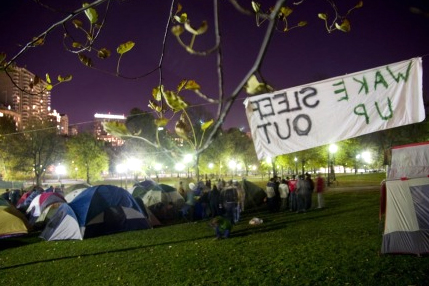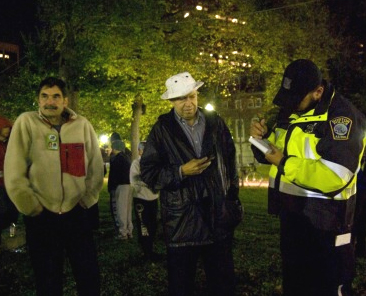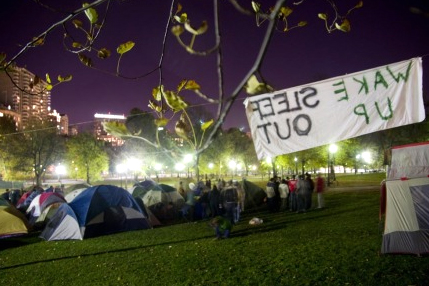 Students take a stand on Boston Common.Ian MacLellanIt seemed like I had just fallen asleep in my bivvy on the hard soil of the Boston Common on Sunday night, when I was rudely awakened around 1:00 a.m. by the voice of Craig Altemose, founder and driving force behind the Massachusetts Leadership Campaign, crackling through a bullhorn: “Wake up everybody. The police are here and they have given us a two-minute warning. If you do not want to be cited for trespassing, you need to move immediately off the Common.”
Students take a stand on Boston Common.Ian MacLellanIt seemed like I had just fallen asleep in my bivvy on the hard soil of the Boston Common on Sunday night, when I was rudely awakened around 1:00 a.m. by the voice of Craig Altemose, founder and driving force behind the Massachusetts Leadership Campaign, crackling through a bullhorn: “Wake up everybody. The police are here and they have given us a two-minute warning. If you do not want to be cited for trespassing, you need to move immediately off the Common.”
One hundred and fifty students and community supporters gathered for the third time to sleep out the Common, a weekly focal point for dozens of on-campus sleep-outs that began the day after 350.org’s Oct. 24 Day of Climate Action. This Sunday we were joined by Dr. James Hansen, whose crumpled porkpie hat I picked out of the crowd as students and community supporters stumbled out, bleary-eyed, of the 44 tents pitched directly across Beacon Street from the Massachusetts State House.
The Boston Police were very relaxed as they collected identification, and not everyone followed the advice of our National Lawyer’s Guild attorneys to offer nothing beyond the most basic information. I found myself standing behind Hansen, who did follow instructions, but not for lack of trying by the officer questioning him, who seemed genuinely befuddled by the presence of this grandfatherly physicist from Pennsylvania. “Do you have kids here?” he asked Jim, “Aren’t there enough causes in Pennsylvania that you have to come all the way to Boston to collect a summons?”
Hansen, of course, has no shortage of climate action opportunities and it’s a measure of the intelligent strategy crafted by Students for a Just and Stable Future (formerly Massachusetts Power Shift), that the NASA scientist would choose to come to Boston. Like the Climate Ground Zero direct actions at Coal River Mountain, which Hansen has also personally joined, the Massachusetts student campaign is important for several reasons.
The campaign aims to put Massachusetts on record endorsing Hansen’s call for 350 ppm and pass legislation requiring 100 percent clean electricity in the Commonwealth by 2020. These are common sense, measured objectives, which appear startlingly bold only against a backdrop of dinky measures advanced by major environmental organizations willing to compromise before conflict is even joined, as repeatedly demonstrated in the handling of Waxman-Markey and Boxer-Kerry.
“Wake Up – Sleep Out!” is also a brilliant tactic, with great promise to spread to campuses throughout the U.S. In what has become a nightly ritual at every sleep-out, participants gather to sit in a tight circle, each standing in turn to introduce themselves, state which college they attend, give the date on which they “woke up,” how many nights each has spent out of doors, and when they plan to sleep-out next. On Sunday, there were students from Bunker Hill Community College and Amherst, Westfield State and Hampshire College (my alma mater), UMass and Worcester Polytechnic Institute, Harvard, Tufts, Boston University, Mount Holyoke and Smith College, among others. Significantly, regarding the prospect for spreading the campaign outside Massachusetts, there were also students from Vermont, Maine, and Connecticut.
Marla Marcum, chair of the Climate Change Task Force of the United Methodist Church in New England, and a key campaign leader, compared the student action with the biblical story of Esther, bride to a Persian king who overstepped protocol, knowing the penalty was death, in order to save her people from annihilation. “When Esther hesitated to take a personal risk in order to safeguard the future of her people,” said Marla, “her uncle encouraged her, saying, ‘Perhaps you have come for a time such as this.’ Today we are in a position to call on our leaders to safeguard the future of all people. Like Esther, we must choose between doing the usual thing, the safe thing, the comfortable thing and doing what is right and necessary, even at some cost.” The Mass Leadership students are doing the right thing – calling upon Governor Deval Patrick to introduce 100 percent renewables legislation and refusing to sleep in dorms powered by dirty coal, in order to make there plea emphatic.
 Ken Ward (left) and James Hansen (center) identify themselves to Boston police.Ian MacLellanOne cannot spend a night on the Common and come away with any thought that the sleep outs are a gimmick. These smart, earnest students — who head to their tents between 6-8 each night, pull out laptops and study – are making a profound statement about how dire the climate climate crisis is, how we are all intimately, individually and institutionally culpable, and how change, if it is to come in time, demands action outside the confines of what might be called “personal life-as-usual.”
Ken Ward (left) and James Hansen (center) identify themselves to Boston police.Ian MacLellanOne cannot spend a night on the Common and come away with any thought that the sleep outs are a gimmick. These smart, earnest students — who head to their tents between 6-8 each night, pull out laptops and study – are making a profound statement about how dire the climate climate crisis is, how we are all intimately, individually and institutionally culpable, and how change, if it is to come in time, demands action outside the confines of what might be called “personal life-as-usual.”
If there is a single failure that stands above the swirl of missteps, cognitive dissonance and blind obedience to organizational imperatives that has fatally undermined the U.S. environmentalist climate agenda, it is our seeming incapacity to act as if we believe what we are saying. We are so close to the tough, daily, grinding business of trying to push immense political stones up hill, that there is little opportunity to step back and contemplate what it is we communicate by the sum total — the gestalt — of our efforts.
Imagine a make believe land, similar to our own, but in which Dr. James Hansen was delayed by a couple decades in putting his finger on the problem. In this land, climate change would not leak by drips and drabs into the national conscience. The crisis would appear full blown, our attention to it riveted, perhaps, by the sudden disappearance of the Arctic ice cap.
In such straits, what might environmentalists do? I expect leaders in this make believe land, shocked by the terrible threat of planetary decimation and stunned by the scale of change and minuscule timeframe within which a functional, global solution must be achieved, would intuitively rush to take actions which we in the real world, faced with what Bill McKibben calls a “slow moving” crisis, have not envisioned. The couple hundred individuals who control institutional environmentalism in the make believe world, as they do here, would convene and form a joint campaign, coalition or conference, determine that all secondary programs should be dropped and all extent reserves invested in a single, last minute effort.
Having quickly, brutally and dramatically reconfigured their institution, environmentalists in make believe land — without yet having determined what to demand or how to go about winning — would have acquired more power and singleminded purpose than U.S. environmentalists, with two decades to prepare, have yet mustered. Our mirror environmentalists would be acting appropriately in the circumstances, underlining their statements of dire risk through serious and appropriate action.
The Massachusetts Leadership Campaign is nearly unique, here in the real world, because its student leaders have taken steps — moderate, to be sure, but firmly and emphatically outside ordinary life, where looming climate cataclysm is fended off or downplayed.
Climate cataclysm cannot be averted by half measures plumped by half hearted spokespersons employed by organizations conducting business as usual. Sleeping out on campus, in the community and on the Boston Common may seem small potatoes compared to the well oiled ACES juggernaut, but it would be a mistake to think so. At its core, the Mass Leadership Campaign presents a profound moral challenge to denial, which is far more dangerous to the status quo than anything else we are doing.




